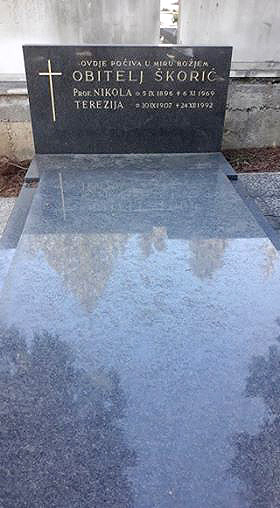He did not answer my calls and letters, but when I came to the apartment, he was there and started walking down after me, agitated and yelling, trying to shoo me away from the old piss stained steps I climbed since I was barely walking. I grabbed two of them now at a time, but I remember them since I went up them on all fours. When I left, he went to the police to file a complaint against me, telling them that I came to Zagreb "to liquidate him." While the police was sympathetic to my story, they indeed said that I should stay away from his property if he so wishes and that there is nothing much they could do to mend our broken family. He never spoke to me again. His grandson, then 2, came to Europe that winter to see his grandparents, and he saw his maternal grandparents in Montenegro, and he saw my mother in Zagreb (who came from Germany to see him), but he never saw my dad.
There was an opportunity again seven years later, which my dad also missed. In hindsight his grandson is everything he ever wanted from his children: he is smart, he goes at one of the best high schools in the world, and he is always making the honor roll with his grades. He is also a little pudgy, likes to eat, and cares about appearances and social norms way more than I do. In a way he is more similar to my dad than he is to me and than I am to my dad. My dad would simply love his grandson if he knew him. He would be immensely proud of his gradson going to a specialized high school in New York City. But he didn't want to know him. Instead he spent the last decade of his life in fallow misery. Then he died.
I was not notified. If an old high school friend of mine did not see the obituary in the newspapers in Zagreb, I might never know he did. In the obituary my name was missing. There was no mention of either me, my wife, or our son. As if none of us existed. We were erased from the family. Thanks to internet, we were able to place our own obituary for him in Croatian newspapers and even send flowers to his funeral. While it was pretty clear to me that, if I was omitted from the obituary, I was most likely not mentioned in the will either, I asked another high school friend, a lawyer, to poke around the inheritance. My dad, after all, was wealthy, everyone knew that. Before he even knew my stepmother he had a Suisse bank account: I was with him at the bank in Chiasso.
The will, that she produced, predictably had him leave everything to her to do what she pleased with it. None of the kids were even mentioned in the will. But, that was not all! He knew the Croatian law would entitle me to a half of what I would get if there was no will. The inheritance would automatically be split in 3 parts: stepmother, halfbrother, and me. With me excluded, I was still entitled to 1/6 of it. He had a pretty accurate idea that I would pursue that. So, he did not leave much to be inherited. He died a pauper. All his bank accounts were nearly empty at the moment of his death (and Croatia has no more luck than FBI in trying to get Switzerland to disclose bank accounts and balances there, so we can never know what he left there). He, also, disposed of all of his real estate property during the last decade of his life by gifting it to the stepmother, halfbrother, or to her firstborn, or by selling it. My grandmother's apartment, the one I grew up at, the one he grew up at, the one I always stayed in when visiting, and the one he did not let me in in 2005, he sold in 2007 to some woman that today runs a PR agency out of it. He got good money out of it. But that money was nowhere to be found. The bank account, opened a month before the sale solely to receive that money, was closed a month after, when the money was taken out. The stepmother claimed it was already long spent. He never told neither me, nor his sisters (who also grew up in that apartment and had a claim to it, but are living abroad without a practical way to contest his actions) that he sold it. That apartment is still my official address in Croatia. Actually without it, all my physical ties to Croatia are practically gone: my son will never really live or vacation there (he is spending this summer in Montenegro). Croatia lost us thanks to my stepmother.
My dad always cared about appearances. He cared about his legacy. About what will he leave after himself. How he will be remembered. While he did not speak to his father before grandpa died (runs in the family, perhaps), he bought the grave site, and paid for a decent, socially presentable grave for his father. The true secret of that grave today is that he too is buried in it, and without any visible record of that: his name is not on the grave. He lays there forgotten and not mentioned. Nothing is left of him. Not like he would have wanted or had expected to go. Not like a 'pharaoh' goes. Damnatio memoriae he richly deserves being a 'pharaoh' that did not care for his posterity, his name erased from the history, like Hatshepsut's. However, it is not I, the one he disinherited, that burried him: it is my stepmother, the one that inherited his entire kingdom! What ingratitude. But he was a difficult man, and after 39 years of suffering him, I bet she had enough. He was fond of quoting Latin proverbs. One of his favorites was: "Quidquid agis, prudenter agas, et respice finem." (Whatever you do, do it prudently, and consider the end.) Well, in the end, pardon the pun, it looks like he did not think of that ultimate end well enough. The history laughs at him now for the eternity. And I am sure he is getting ribbed down there by his mom and dad for doing what he did to their beloved grandson, falling under the spell of "that woman" (my grandma in her older age did not mention my stepmother's name any more, out of disgust) and missing the opportunity that his life generously extended to him to meet his US-born grandson. May he continue to rot in an unmarked grave, as a curse would say. Respect the End.
 |  |  |
 There is a certain pleasure I have looking at this grave. It contains a secret. The names you see are the names of my grandfather and of my grandmother, the parental figures who cared for me when I was very little, during preschool and early elementary shool age. My father bought this grave in 1969, when my grandfather, his father died. Grandpa died of heart attack while reading a book in ancient Greek, which was his favorite pastime. He just fell off the chair, suddenly. I was the only one in the room to witness it. I run to the kitchen to alert grandma. Soon a neighbor was over trying CPR and the EMS came, but it was already too late.
There is a certain pleasure I have looking at this grave. It contains a secret. The names you see are the names of my grandfather and of my grandmother, the parental figures who cared for me when I was very little, during preschool and early elementary shool age. My father bought this grave in 1969, when my grandfather, his father died. Grandpa died of heart attack while reading a book in ancient Greek, which was his favorite pastime. He just fell off the chair, suddenly. I was the only one in the room to witness it. I run to the kitchen to alert grandma. Soon a neighbor was over trying CPR and the EMS came, but it was already too late.